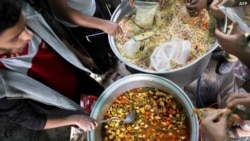On July 15, the Russian Embassy in Egypt commented on U.S.President Joe Biden’s first trip to the Middle East since taking office 18 months ago.
Biden’s visit included stops in Israel, the West Bank and Saudi Arabia, where he met the leaders of the Gulf Cooperation Council (Bahrain, Kuwait, Oman, Qatar, Saudi Arabia and the United Arab Emirates) plus the leaders of Iraq, Egypt and Jordan.
A chief topic: the global food and fuel crises created because of Russia’s attack on Ukraine.
The embassy’s statement claimed the U.S. is deceiving the world by blaming Russia for blocking food shipments from Ukraine, a top exporter of wheat and other grains. And it blamed the U.S. for food shortages confronting countries in Africa and elsewhere.
“The Biden administration is mired in lies, covering up the US desire for global hegemony and theft of the national wealth of other countries, including in Africa,” the embassy said.
“Moreover, on this path, many of them are especially exposed to the threat of starvation, to dictate their conditions later.”
That is false. It’s Russia that has blocked grain exports from Ukraine, while the U.S. has been the world’s biggest contributor of global food aid for decades and is increasing aid even now.
Ukraine’s grain remains stuck thanks a blockade by Russian warships and mines. Most is intended for countries struggling with COVID-19, particularly in Africa. Russian forces in Ukraine have targeted farmland and agricultural equipment and are accused of stealing grain.
Between 2018 and 2020, Africa imported 44% of its wheat from Ukraine and Russia, while Egypt imported almost 80% of its wheat from the two countries.
Human Rights Watch (HRW) said Russia’s war has disrupted global commodity markets and trade. Many countries in Africa rely on wheat, fertilizer and vegetable oil from Ukraine and Russia, which is the world’s largest wheat exporter followed by the United States.
“Nigeria, the world’s fourth-largest wheat importer, receives a fourth of its imports from Russia and Ukraine. Cameroon, Tanzania, Uganda, and Sudan source more than 40 percent of their wheat imports from Russia and Ukraine,” HRW said.
Africa is facing a shortage of 30 million metric tons of food, mainly wheat, maize and soybeans imported from Russia and Ukraine. Since Russia’s launched its invasion in February, wheat prices in Africa have increased by 45%, while farmers there are paying 300% more for imported fertilizer, the African Development Bank (AfDB) stated.
Russia launched its war as 13 million people in the Horn of Africa face severe hunger because of drought. On May 20, the United Nations said food insecurity in the Africa’s central Sahel region was set to reach its highest level since 2014, leaving 18 million people on the edge of severe hunger.
Russian President Vladimir Putin blames Western economic sanctions for spiking food and energy prices since the war began. But Western officials dismiss that, noting that sanctions exclude Russian agricultural products and humanitarian aid.
“When we imposed sanctions on Russia so that it would end its aggression against Ukraine as quickly as possible, we deliberately created exceptions for agricultural goods, for fertilizer, for insurance, and shipping necessary to move these products precisely to avoid worsening the food crisis,” U.S. Secretary of State Antony Blinken said on June 24.
The Associated Press reported that despite the exemptions, sanctions “have targeted Russian shipping and made international shipping companies reluctant to transport Russian cargoes.”
But Blinken said, “Nothing – nothing is preventing food and fertilizer from leaving Russia, and only one country is blocking food and fertilizer from leaving Ukraine, and that is Russia.”
In a June meeting with Senegal’s President Macy Sall, who chairs the African Union, Putin said Russia was ready to “facilitate the peaceful passage and guarantee the safety of arrivals” for ships seeking to export grain from Ukraine.
But, according to AP, Ukraine “fears that opening up safe corridors to Ukrainian ports could make them vulnerable to Russian attack.”
Reuters reported on July 19 that the E.U. is considering softening some sanctions on Russian banks to encourage food exports from Russian ports.
During June’s G7 summit in Germany, U.S. President Biden pledged an additional $2.76 billion to protect the world’s most vulnerable populations from hunger. That is more than half of the more than $4.5 billion in additional resources pledged by G7 leaders.
In all, the U.S. has pledged a total of $5.56 billion for global food security since the start of Russia’s invasion.
On July 18, the United States Agency for International Development (USAID) announced $1.3 billion in humanitarian assistance to the Horn of Africa to help avert mass starvation due to drought and the war in Ukraine. The agency said skyrocketing food, fuel and fertilizer prices are hitting Ethiopia, Kenya and Somalia hard.
Washington is also supporting the AfDB’s $1.5 billion initiative to feed Africa and its Africa Disaster Risk Financing program, aimed at helping African governments to respond to food insecurity caused by severe weather conditions.
Meeting in Tehran on July 19, Putin and Turkish President Recep Tayyip Erdogan reportedly made progress in talks about a path for Ukraine grain shipments through the Black Sea, The Moscow Times reported.
Turkey is a member of the U.S.-led NATO defense alliance but also has military designs in northern Syria, where Russia has propped up the regime of Bashar Assad.






